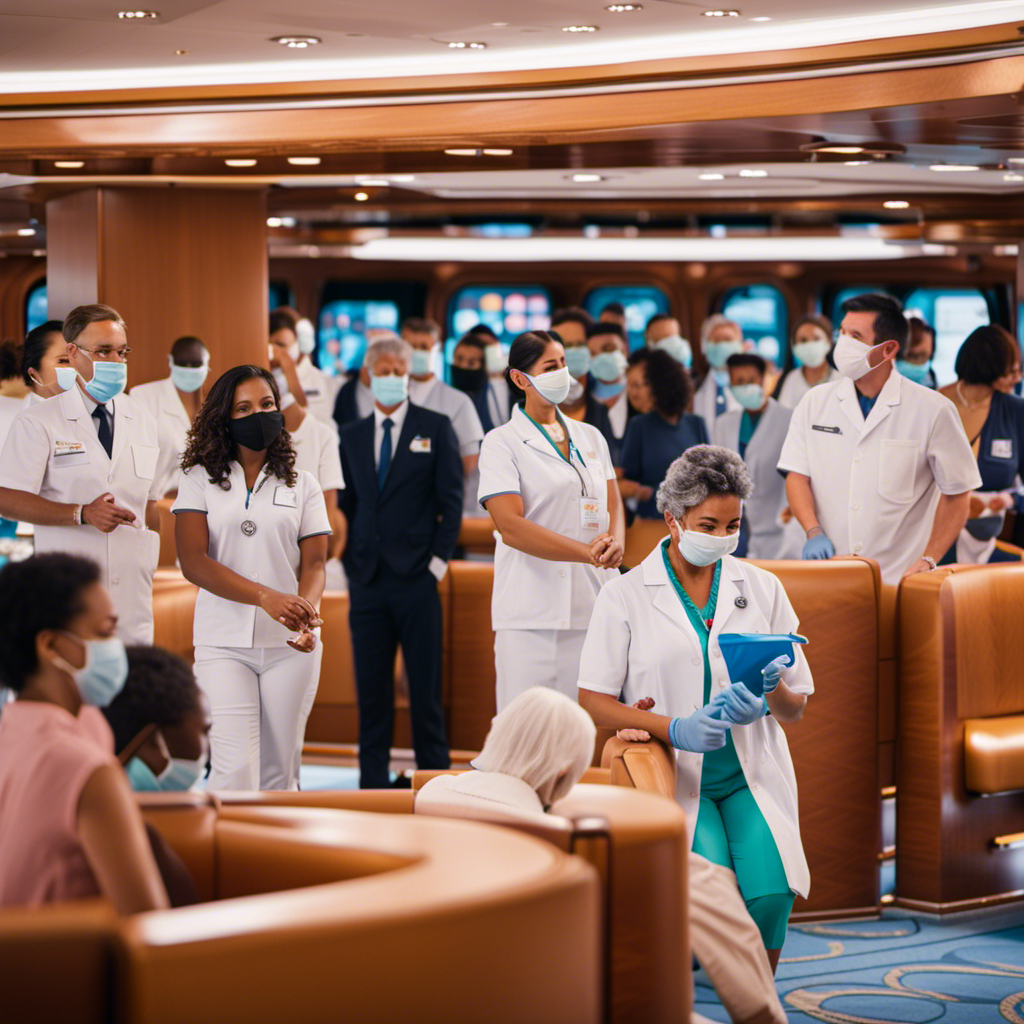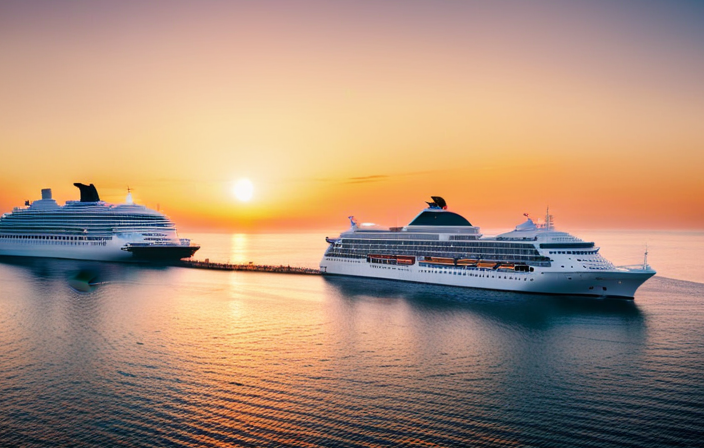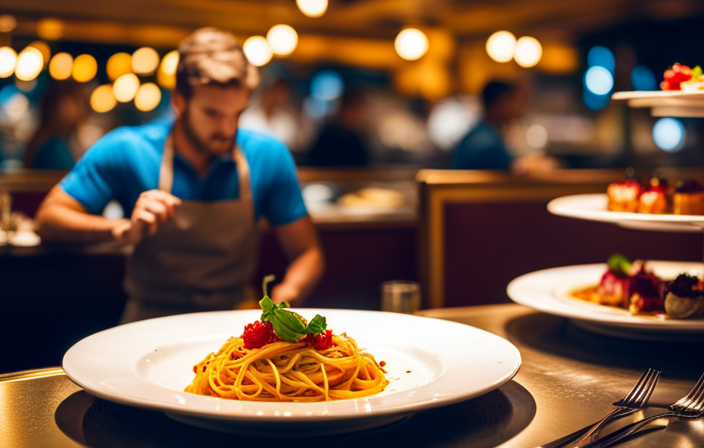I’ve always been mesmerized by the charm of cruise ship journeys – the excitement of exploring unknown territories, the luxury of the onboard facilities, and the adventurous essence they represent.
However, amidst the COVID-19 pandemic, the safety considerations surrounding cruising have become more complex. In this article, I will delve into the health risks associated with cruise ships, the importance of vaccinations, and the financial considerations that come into play when booking a cruise.
By understanding these factors, we can make informed decisions and ensure a safe and enjoyable cruising experience.
Key Takeaways
- Vaccination is a crucial aspect of sailing safely on cruise ships, with many cruise lines implementing vaccination requirements for passengers.
- Cruise lines have implemented various safety protocols such as testing requirements, mask wearing, social distancing rules, improved air filtration, and increased sanitation.
- The Omicron variant poses challenges to cruising in early 2022, with an increase in non-green ships and uncertainty about its impact.
- Booking a cruise carries financial risks, but many cruise lines offer generous compensation and options for refunds or cruise credits. Travel insurance can provide added protection.
Understanding Health Risks on Cruise Ships
I understand the importance of understanding the health risks on cruise ships and the measures being taken to ensure safety.
Cruise ship COVID-19 cases have been a concern throughout the pandemic. However, since the resumption of sailing, there have been relatively low numbers of cases reported on cruise ships.
Cruise lines have implemented new procedures to prioritize the safety of passengers and crew. Vaccination is now a cornerstone of sailing safely, with many cruise lines requiring passengers to be fully vaccinated before boarding. Testing requirements have also been put in place to detect any potential cases before embarkation. Additionally, mask wearing and social distancing rules are enforced onboard. Cruise lines have also made changes to improve air filtration and increase sanitation.
Concerns about the Omicron variant have led to the CDC assigning color status to ships based on COVID-19 cases. The high transmissibility and ability to evade immunity of the Omicron variant have raised concerns for cruising in early 2022. However, it is hoped that the variant will burn out quickly.
In the event of illness on board, cruise lines have plans in place for cases to be isolated and contact tracing to be conducted. Positive cases may be transported home early, while the cruise may continue as normal if cases are limited. The response depends on the specific situation onboard.
It is also important to consider the financial risks of booking a cruise. Trip cancellations and loss of payment are possibilities, so travel insurance is recommended to protect your investment. Major cruise lines have refund and cancellation policies in place, and many offer generous compensation for cancelled trips. While refunds may take some time, complaints have decreased. Smaller, private cruise lines may have uncertain financial stability, so it is important to be aware of this when booking.
Lastly, potential interruptions and denials can occur on a cruise due to COVID-19 concerns. Some ports may be closed or deny entry to cruise ships, leading to potential itinerary changes. Passengers should be prepared for these possibilities and understand that ports have the final say in allowing a ship to dock.
Overall, cruise lines have implemented measures to ensure safe passage home, including vaccines and testing before boarding to mitigate risks.
Importance of Vaccinations for Cruise Ship Travel
Getting vaccinated is crucial for anyone planning to travel on a cruise. Vaccination mandates have had a significant impact on cruise ships, with vaccination rates being a key factor in ensuring the safety of passengers and crew.
Here are three important points to consider:
-
Vaccine mandates: Many cruise lines now require all passengers and crew members to be fully vaccinated before boarding. This helps to create a vaccinated environment onboard and reduces the risk of COVID-19 transmission.
-
High vaccination rates: The implementation of vaccine mandates has led to high vaccination rates on cruise ships. This not only protects individuals from severe illness but also contributes to the overall safety and well-being of everyone onboard.
-
Enhanced safety measures: In addition to vaccine mandates, cruise lines have implemented various safety measures such as testing requirements, mask-wearing, and social distancing rules. These measures, combined with high vaccination rates, help to minimize the risk of COVID-19 outbreaks and ensure a safer cruising experience for all.
Financial Considerations When Booking a Cruise
When booking a cruise, it’s important to be aware of the potential financial risks involved and to consider travel insurance for added protection. One of the main concerns is the possibility of cruise cancellation and loss of payment. It’s crucial to understand the cruise lines’ refund and cancellation policies before making a reservation.
Fortunately, cancellations have been low since cruises have returned, and many cruise lines offer generous compensation for cancelled trips. In case of a cancellation, passengers may receive a full refund or 125% cruise credit. However, refunds may take some time to process, although complaints have decreased.
It’s also important to note that smaller, private cruise lines may have uncertain financial stability, while major publicly traded cruise companies have raised capital and appear stable. To mitigate the financial risks involved, it is highly recommended to consider purchasing travel insurance that covers financial default for added protection.
Safety Protocols and Procedures on Cruise Ships
Implementing new procedures and protocols has been crucial for ensuring the safety of passengers and crew on cruise ships. Cruise lines have taken significant steps to enhance passenger safety and mitigate the risks of COVID-19. These measures include strict vaccination requirements for all passengers and crew, testing before boarding, and the implementation of mask-wearing and social distancing rules. Additionally, cruise lines have made changes to improve air filtration and increase sanitation onboard. These protocols have resulted in a low number of COVID-19 cases on cruise ships since resuming sailing. The table below summarizes some of the key cruise line protocols that have been put in place to ensure the safety of passengers and crew:
| Cruise Line Protocols |
|---|
| Vaccination requirements |
| Testing before boarding |
| Mask-wearing and social distancing |
| Improved air filtration |
| Increased sanitation measures |
These protocols are continuously reviewed and updated to ensure the highest level of safety for everyone onboard. Cruise lines prioritize the health and well-being of their passengers and crew, and these protocols play a crucial role in maintaining a safe and enjoyable cruising experience.
Managing Illness and Response on Cruise Ships
I am responsible for ensuring the well-being of passengers and crew in the face of illness on cruise ships. When it comes to managing illness and responding to cases on board, quarantine procedures and contact tracing are crucial.
If someone on the ship becomes sick, they are immediately isolated in a designated area to prevent the spread of illness. Contact tracing is then conducted to identify individuals who may have been in close proximity to the sick person. These individuals are closely monitored and may be tested for the illness.
Depending on the severity of the situation, positive cases may be transported home early. However, if the number of cases is limited and under control, the cruise may continue as normal.
The response to illness on board is always tailored to the specific situation and prioritizes the health and safety of everyone on the ship.
Navigating Potential Itinerary Changes on a Cruise
Navigating potential itinerary changes on a cruise can be challenging. Ports have the final say in allowing a ship to dock, and some countries may not be open to ships at all. When planning a cruise, it’s important to be aware of the potential for itinerary changes due to port entry restrictions.
Ports may deny entry if there are suspected cases of illness on board or if they have their own health protocols in place. Passengers should be prepared for the possibility of changes to their planned ports of call.
Cruise lines have implemented measures such as contact tracing and testing to help limit the impact of outbreaks and ensure safe passage home. It’s crucial to stay informed and flexible when it comes to potential itinerary changes, as the situation can be complex and subject to change.
Travel Insurance and Protection for Your Cruise Investment
When booking a cruise, it’s important to consider the financial risks involved and the potential for trip cancellation. That’s where travel insurance comes in.
Travel insurance coverage provides cancellation protection and can help protect your investment. In the event that you need to cancel your cruise due to unforeseen circumstances, such as illness or a family emergency, travel insurance can provide reimbursement for non-refundable expenses. This can include the cost of the cruise itself, as well as any pre-paid accommodations, flights, or excursions.
It’s essential to carefully review the coverage details of your travel insurance policy to ensure it meets your needs. Additionally, some cruise lines offer their own refund and cancellation policies, but having travel insurance can provide extra peace of mind.
Ensuring Cruise Ship Safety: Vaccinations, Health Risks, and Financial Considerations
Implementing new safety protocols and vaccination requirements have been crucial for ensuring the well-being of passengers and crew members on cruise ships. Cruise ship vaccination requirements have become a standard practice, with most cruise lines mandating that all passengers and crew members be fully vaccinated before boarding.
Additionally, COVID-19 testing protocols on cruise ships have been rigorous, with pre-boarding testing requirements in place to identify any potential cases of the virus. These measures, along with other changes such as mask wearing and social distancing rules, have significantly reduced the risk of COVID-19 transmission on cruise ships.
Improved air filtration and increased sanitation practices have also been implemented to further enhance the safety of passengers and crew members. By prioritizing vaccination and implementing comprehensive testing protocols, cruise lines have taken significant steps to ensure the safety and well-being of all those on board.
Frequently Asked Questions
What Are the Most Common Health Risks on Cruise Ships?
The most common health risks on cruise ships include norovirus outbreaks and complications from seasickness. These can be managed through proper hygiene practices and medications. It’s important to take precautions and seek medical assistance if needed.
Are Vaccinations Required for All Passengers on Cruise Ships?
Yes, vaccinations are required for all passengers on cruise ships. However, there may be some exemptions for medical or religious reasons. Cruise ship vaccination policies prioritize the safety and health of all passengers and crew.
What Are the Financial Risks Involved in Booking a Cruise?
Booking a cruise involves financial risks such as trip cancellation and loss of payment. It’s important to understand cruise lines’ cancellation policies and consider travel insurance for added protection to safeguard your investment.
How Do Cruise Lines Manage Illness and Respond to Cases on Board?
When illness strikes on a cruise ship, procedures kick into gear. Sick passengers are isolated, contact tracing is done, and those affected may be sent home early. Cruise lines have medical facilities and quarantine protocols in place.
What Are the Potential Itinerary Changes That Passengers Should Be Prepared for on a Cruise?
Passengers should be prepared for potential itinerary disruptions on a cruise. Ports may deny entry or change due to COVID-19 concerns. Alternative ports may be used to ensure passenger safety and comply with health protocols.










